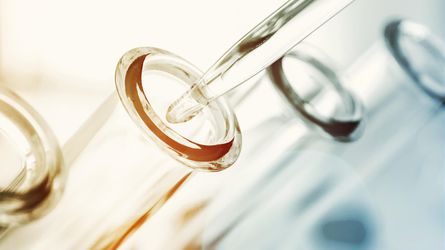
Chemicals
LEWA supplies you with individual chemical pumps and customized system solutions for various areas of application in the chemical industry.
Read more
LEWA delivers diaphragm metering pumps and complete metering systems to handle all types of downstream processing. Examples include gradient mixers for producing gradients and customized systems for inline dilution of buffers as well as metering stations.
These solutions provide the following advantages:
• Precise flow rates (incrementally or linearly variable, 1-99%)
• Reproducible and highly accurate positioning (0.5%)
• Hermetically tight system concept in downstream processing
• Very large reproducible adjustment range of the pump/system
• High availability, reliability and process safety
• Reliable for validation thanks to high precision in downstream processing
• Ability for inline cleaning and damping (CIP/SIP), optionally ventable
• Hygienic pumps available (wetted electropolished, ASME-BPE certified)
• Versions available for installation in clean rooms
• Design as a complete skid with all process-relevant attachments for integration into chromatography systems is possible
• Comprehensive documentation for qualification and validation
• IQ/OQ/PQ support
• Ex protection at the request of the customer
Low- and medium-pressure chromatography, for example
• Preparative liquid column chromatography
• Normal- and reversed-phase chromatography
• Ion-exchange chromatography
• Affinity chromatography, etc.
• Downstream processing for purifying vaccines, innovative therapeutic proteins, monoclonal antibodies, hormones and blood plasma products
High-pressure chromatography
• High-pressure liquid chromatography (HPLC)
• Preparative countercurrent chromatography with supercritical CO2 using SFC (supercritical fluid chromatography)
Get in touch today so that we can talk about a strategy for implementing your downstream processing requirements!
Liquid chromatography is the most important part of the purification process and provides a broad range of physical downstream processing methods for separating complex mixtures of substances.
The components to be separated are divided into two phases: The stationary phase in a column and the mobile phase, which flows through the stationary packing (here, liquid).
How does chromatography work?
A mixture of various components of a liquid/gas enter a process of process chromatography. The goal is to purify the mixture (downstream processing). The various separating and chromatography solutions are pumped through the system at various speeds. The interaction between the stationary and mobile phases in the system varies in intensity, causing the mixture of substances to separate. The lower the affinity of a molecule for the stationary phase is, the shorter the time in a chromatography column is, and vice versa.
Why is chromatography so special and important?
The chemical and bioprocess industries have the need to separate one product from a complex mixture and to eliminate impurities. This is an important step in the entire processing chain (downstream processing / cleaning) to produce a product with the required level of purity. Today there exists a broad range of methods that the industry can use to achieve these goals. For many reasons, chromatography is a very special and selective separation method that has been used for decades—primarily in the area of production. First, it can separate complex mixtures with great precision. Even very complicated molecules such as proteins, for instance, can be carefully separated from each other using chromatography. This way, basically any soluble or volatile substance can be purified if the correct adsorbents, carrier fluids / mobile phases are used and provided that process parameters are adapted and monitored (temperature, pH value, flow velocity, conductivity and much more).
Downstream processing is perfect for separating or purifying sensitive products from the pharmaceutical sector specifically.